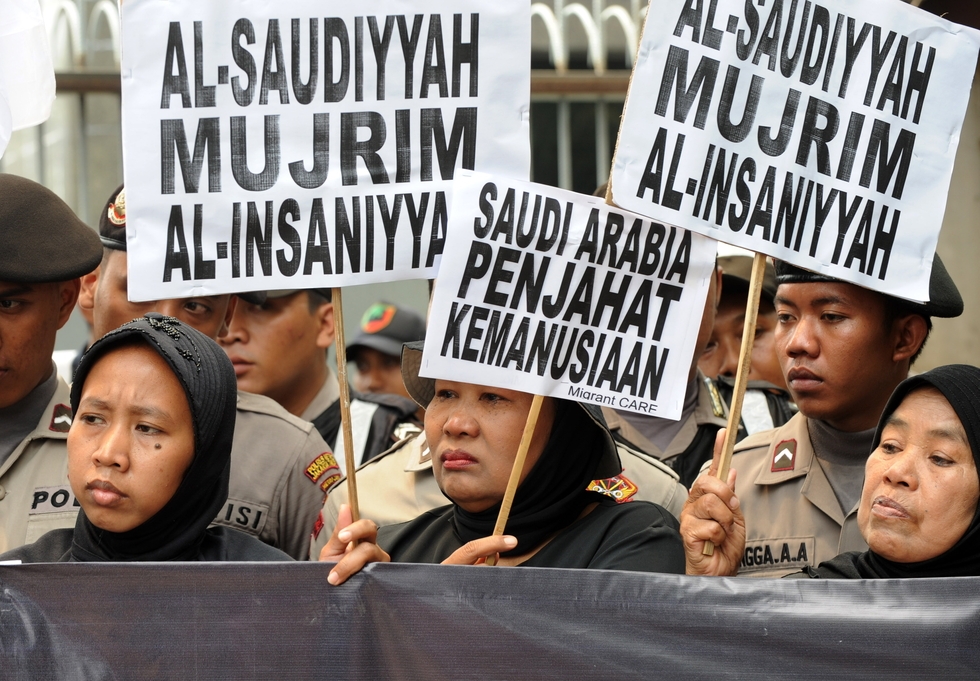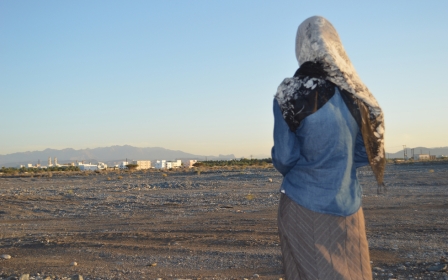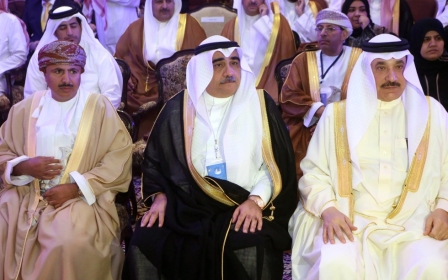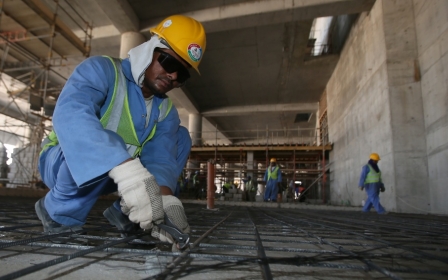Gulf states urged to stop abuse of domestic workers

Every day about a dozen women board a plane from Jakarta bound for the Gulf, adding to the approximately two million domestic workers already living there.
They travel despite a moratorium from the Indonesian government, and despite not knowing whether they will be treated with kindness or cruelty when they arrive.
Stories of women being beaten nearly to death, having limbs amputated for trying to escape and being both physically and mentally abused are often reported in the media.
In October last year, Kasturi Munirathinam's right arm was chopped off, allegedly as a punishment when she tried to escape from her employer in Saudi Arabia.
“I understood that they were going to harm me, so I said to the lady ‘I don’t need any money, please just send me back to India,'” she told the BBC.
“I decided to escape from the house using the sari as a rope, the lady saw that and cut my hand, then from the third floor I fell."
Far more common are cases of women having wages withheld, being forced to work long hours seven days a week, being under-fed, and having their passports confiscated by employers.
Fatia, a domestic worker from Ethiopia, told Middle East Eye that her agency accused her of not wanting to work after she refused to accept abusive situations.
She was over-worked in extreme weather conditions, and was being harassed by her employer’s younger brother.
"He followed me to the bathroom every day and watched me in the shower. He woke me at 4am and started asking me questions, but I didn’t understand what he was saying," she told MEE.
“I had to do everything for 12 people. Nobody did any work. I was washing and rinsing clothes out in the hot sun."
All the work was outside and she suffered sunburn which permanently scarred her face.
"I told them I wanted to leave."
The family tried to prevent Fatia from leaving, but a neighbour intervened and took her back to the agency.
Her next employer under-fed and over-worked her. Again, she asked to be taken back to the agency.
"The agency were so mad at me, saying I didn’t want to work. I said I wanted to work but the people were not nice. If they are nice, I will work.”
Fatia is unusual in her unwillingness to accept poor working conditions and abusive employers. Her final family treated her well, she said, and so she stayed and worked for them willingly.
"Most girls would not be able to fight like her," said Fatia's new sponsor, Salma.
"She’s brave. Her friend was not paid for two years and had to go home with nothing.”
A recent report published by the Gulf Research centre said there were “high levels of exploitation and abuse by employers” in the GCC.
As well as economic exploitation such as withholding wages, “employer’s power over the MDW (migrant domestic workers) can also be exerted through physical, verbal and psychological abuse,” writes Bina Fernandez in Essential Yet Invisible: Migrant Domestic Workers in the GCC.
“Employers may deprive (workers) of food, health care, and adequate rest time and sleeping arrangements; they may also forbid (them) from communicating with their families or friends, restrict their mobility outside the household, and verbally insult and humiliate them.”
No legal protection
The International Labour Organisation estimates that 600,000 migrant workers in the Gulf are forced to work against their will. However, that figure may be a low estimate due to the number of undocumented workers and the fact visas are often illegally sold and copied.
Local news sources in Qatar last year reported the case of an Indonesian woman who was in hospital for three days after escaping what she called “three years of abuse,” including beatings with the metal end of a hose.
Three days after the attack, the woman said she had not been contacted by police or asked to give a statement.
Shelter Me, set up to empower domestic workers, conducted the airport survey in Jakarta as part of a wider project to prevent abuse of women working in the Gulf.
According to advocacy group Migrant-Rights.org, which is involved in Shelter Me, banning women from travelling to the Middle East for work increases the risk.
“Overall reactions to abuse and ill-treatment has been bans by sending countries, as we have seen most recently in the case of Indonesia to the GCC and Uganda to Saudi,” said Vani Saraswathi, the associate editor of Migrant-Rights.org and strategic adviser to Shelter Me.
“This only forces the workers to migrate in irregular ways, making them more vulnerable.”
In June 2015, Kuwait adopted new labour laws specifically relating to domestic workers, making it the first Gulf state to offer any form of legal protection, including a weekly day off, a cap on working hours, and annual leave.
Cultural difference
Domestic workers in other Gulf states are still explicitly excluded from labour laws, said the Gulf Research Centre report.
This means they are the sole responsibility of their Kafeel, or sponsor.
According to Migrant-Rights.org, this can contribute to the controlling attitude of the employer to the domestic worker, which in turn can lead to restriction of the woman’s movements and mistreatment in the home.
The resulting isolation is one of the main contributing factors to the vulnerability of the housemaids.
Other reasons include cultural differences that lead to employers not trusting their workers.
“With nationals, an oft-repeated reason is protection of national identity and privacy, which means keeping the ‘other’ under control,” Saraswathi said.
“In countries like Saudi where mobility of female citizens itself is restricted, speaking of basic rights of DWs [domestic workers] is very tough.
“It is a complex issue in the Gulf. Employers believe the greater control they have over the worker’s mobility and communication, the less risk of her ‘running away’ or being influenced by others.
“This is a very tough wall of reasoning to break through.”
The lack of legal protection also makes accurate figures of those being mistreated hard to come by. This is compounded by the fact that women returning home will often not speak about their experiences to avoid being seen as failures.
Migrant-Rights.org and Hivos, another group involved in Shelter Me, are now trying to improve the lives of domestic workers by addressing the attitudes that can contribute to mistreatment.
Rather than focusing exclusively on the employers the groups are also trying to teach workers their rights and what they can expect when they travel to the Gulf.
“Workers we have spoken to may complain of being overworked, but they don’t perceive it as abuse,” Saraswathi said.
“Only when food is withheld, a salary is not paid or they are physically abused do they protest. So there is that aspect of she herself not being conscious of her ‘worker’ status.
“This is not unique to the Gulf. Domestic work is not considered work and is excluded from labour laws in most parts of the world. In the Gulf it becomes even trickier as class division and gender biases are more pronounced.
“Further, the women come from countries that have similar patriarchal and restrictive environments. There is little awareness that they deserve and should ask for rights."
Accepting their fate
ShelterMe, along with Migrant-Rights.org, has now produced a guide for employers of domestic workers. It includes advice on keeping track of hours worked, break times, days off and paid leave.
It suggests drawing up a contract in the workers' language to make the working relationship clear on both sides. In the absence of legal protection, this is thought to be a step towards society understanding the need for change.
“From an outsider’s perspective maybe this is a strange thing to have,” Myriam Vandenbroucke from Hivos told Middle East Eye. "But I think in general this is how domestic workers are viewed in the GCC; views which are partly fed by the Khafala system."
In 2013, Amnesty International released My Sleep is my break: Exploitation of Migrant Domestic Workers in Qatar.
The report quotes a recruiter telling a potential employer that they do not need to give their employee a day off or allow her access to a phone.
"It is as you like madam, the same with working hours, it is as you like, no problem about hours," the agent continues.
Recent figures released in Qatar put the number of domestic workers at 154,000.
Domestic workers are often lied to about the amount of work they will do and who their sponsors are. One woman speaking to Amnesty said that her sponsor had two children, but she was sent to work for her sponsor's friend who had seven.
When they complained to their recruitment agent, they were often told they had to stay in place.
CL, whose anonymity has been protected, told Amnesty that her female employer "would get mad and shout at us ... sometimes you would get a slap ... she pinched my arms until they were black ... I tried to ring the agent. He said he would not help. I said, 'She beats me,' he still said he wouldn’t help.”
Recruiters also did not listen to complaints about wages, which were often less than half of what had been promised, and sometimes withheld altogether.
In the case of one Filipino maid, her promised wage of $400 a month for nine-hour days was reduced to $220, for which she was expected to work up to 17 hours a day.
Psychological impact
According to Amnesty, this deception can lead to psychological problems and depression.
In March 2013, Amnesty was told by officials at Hamad Hospital’s psychiatric unit that the number one cause of admission to the unit was anxiety or depression caused by deception about work. Two thirds of these admissions had made attempts on their own lives.
Domestic workers often feel they need to accept their situations because they are totally reliant on the sponsorship of their employer.
Vandenbroucke told MEE that the acceptance of poor conditions was part of a "migration cycle" that began in the workers' own countries.
“They do not know their rights or their status as a worker," she said.
“We see that the isolation can start in the training stage when their mobile phones are taken away and they are not allowed to leave."
ShelterMe is aiming to redress these attitudes, both among the workers and the employers, in a bid to create societal change and improve the lives of the millions of women working in the Gulf.
“I think there are two ways that laws can be changed,” said Vandenbroucke. "One comes from the government making a decree, and the other comes from society.
“We need to change the discourse around domestic workers and change the way people think of them. We are looking to improve the dialogue between employers and employees as well.”
ShelterMe is the first project of its kind in the GCC that addresses the plight of domestic workers from both the sending and receiving countries.
It runs workshops for employers where they can talk about their relationship with the domestic workers, as well as encouraging sending countries to train the women properly so they know what is expected of them and what to expect in return.
“At the moment domestic workers are only really discussed to be complained about,” said Vandenbroucke. “We are trying to change that with the workshops.
"Employers see the good things other people are doing. It is starting to change attitudes.”
RUNAWAY MAID: Read how an Ethiopian maid in Oman fought back and fled her abusive employers
New MEE newsletter: Jerusalem Dispatch
Sign up to get the latest insights and analysis on Israel-Palestine, alongside Turkey Unpacked and other MEE newsletters
Middle East Eye delivers independent and unrivalled coverage and analysis of the Middle East, North Africa and beyond. To learn more about republishing this content and the associated fees, please fill out this form. More about MEE can be found here.




